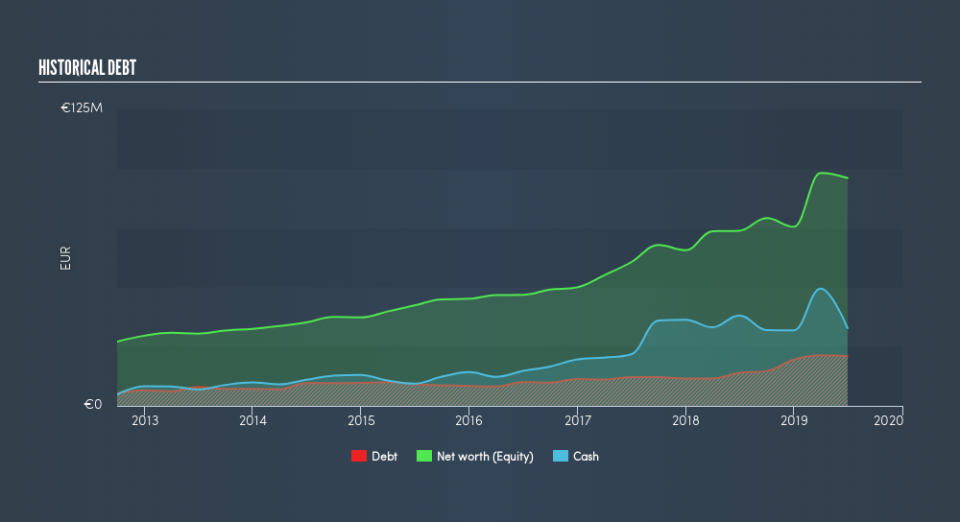Here's Why Basler (ETR:BSL) Can Manage Its Debt Responsibly

Warren Buffett famously said, 'Volatility is far from synonymous with risk.' So it might be obvious that you need to consider debt, when you think about how risky any given stock is, because too much debt can sink a company. We can see that Basler Aktiengesellschaft (ETR:BSL) does use debt in its business. But the more important question is: how much risk is that debt creating?
When Is Debt A Problem?
Debt assists a business until the business has trouble paying it off, either with new capital or with free cash flow. In the worst case scenario, a company can go bankrupt if it cannot pay its creditors. However, a more usual (but still expensive) situation is where a company must dilute shareholders at a cheap share price simply to get debt under control. Of course, debt can be an important tool in businesses, particularly capital heavy businesses. The first thing to do when considering how much debt a business uses is to look at its cash and debt together.
View our latest analysis for Basler
What Is Basler's Net Debt?
The image below, which you can click on for greater detail, shows that Basler had debt of €20.9m at the end of June 2019, a reduction from €25.3m over a year. But on the other hand it also has €32.8m in cash, leading to a €11.8m net cash position.
How Strong Is Basler's Balance Sheet?
According to the last reported balance sheet, Basler had liabilities of €31.4m due within 12 months, and liabilities of €45.1m due beyond 12 months. On the other hand, it had cash of €32.8m and €23.6m worth of receivables due within a year. So it has liabilities totalling €20.1m more than its cash and near-term receivables, combined.
Of course, Basler has a market capitalization of €357.3m, so these liabilities are probably manageable. Having said that, it's clear that we should continue to monitor its balance sheet, lest it change for the worse. Despite its noteworthy liabilities, Basler boasts net cash, so it's fair to say it does not have a heavy debt load!
It is just as well that Basler's load is not too heavy, because its EBIT was down 58% over the last year. Falling earnings (if the trend continues) could eventually make even modest debt quite risky. The balance sheet is clearly the area to focus on when you are analysing debt. But it is future earnings, more than anything, that will determine Basler's ability to maintain a healthy balance sheet going forward. So if you're focused on the future you can check out this free report showing analyst profit forecasts.
But our final consideration is also important, because a company cannot pay debt with paper profits; it needs cold hard cash. Basler may have net cash on the balance sheet, but it is still interesting to look at how well the business converts its earnings before interest and tax (EBIT) to free cash flow, because that will influence both its need for, and its capacity to manage debt. In the last three years, Basler's free cash flow amounted to 30% of its EBIT, less than we'd expect. That's not great, when it comes to paying down debt.
Summing up
We could understand if investors are concerned about Basler's liabilities, but we can be reassured by the fact it has has net cash of €12m. So we are not troubled with Basler's debt use. Over time, share prices tend to follow earnings per share, so if you're interested in Basler, you may well want to click here to check an interactive graph of its earnings per share history.
At the end of the day, it's often better to focus on companies that are free from net debt. You can access our special list of such companies (all with a track record of profit growth). It's free.
We aim to bring you long-term focused research analysis driven by fundamental data. Note that our analysis may not factor in the latest price-sensitive company announcements or qualitative material.
If you spot an error that warrants correction, please contact the editor at editorial-team@simplywallst.com. This article by Simply Wall St is general in nature. It does not constitute a recommendation to buy or sell any stock, and does not take account of your objectives, or your financial situation. Simply Wall St has no position in the stocks mentioned. Thank you for reading.

